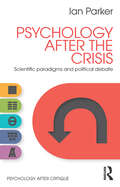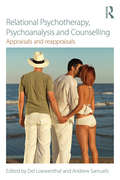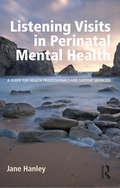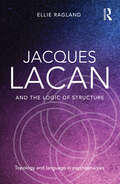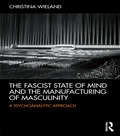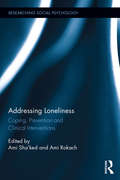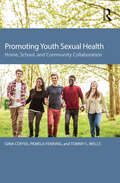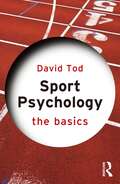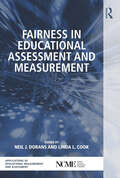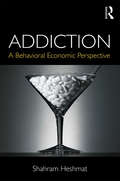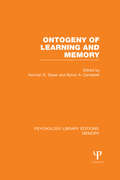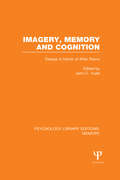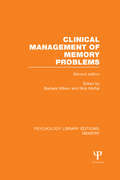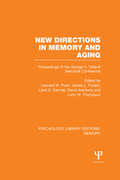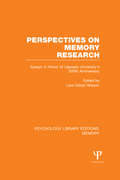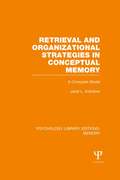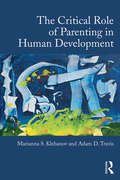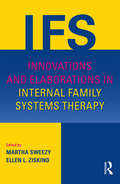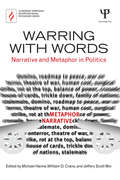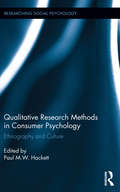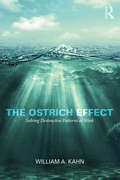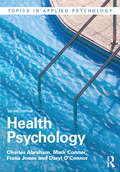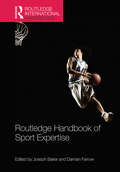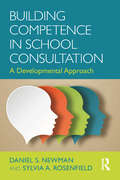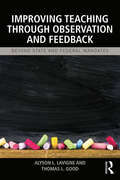- Table View
- List View
Psychology After the Crisis: Scientific paradigms and political debate (Psychology After Critique)
by Ian ParkerIan Parker has been a leading light in the fields of critical and discursive psychology for over 25 years. The Psychology After Critique series brings together for the first time his most important papers. Each volume in the series has been prepared by Ian Parker, features a newly written introduction and presents a focused overview of a key topic area. Psychology After the Crisis is the first volume in the series and addresses three important questions: What was the crisis in psychology and why does it continue now? How did debates regarding the traditional ‘laboratory experiment’ paradigm in psychology set the scene for discourse analysis? Why are these paradigm debates now crucial for understanding contemporary critical psychology? The first two chapters of the book describe the way critical psychology emerged in Britain during the 1970s, and introduce four key theoretical resources: Marxism, Feminism, Post-Structuralism and Psychoanalysis. The chapters which follow consider in depth the critical role of Marxist thinking as an analytic framework within psychology. Subsequent chapters explore the application and limitations of critical psychology for crucial topics such as psychotherapy, counselling and climate change. A final chapter presents an interview which reviews the main strands within critical psychology, and provides an accessible introduction to the series as a whole. Psychology After the Crisis is essential reading for students and researchers in psychology, sociology, social anthropology and cultural studies, and for discourse analysts of different traditions. It will also introduce key ideas and debates in critical psychology for undergraduates and postgraduate students across the social sciences.
Relational Psychotherapy, Psychoanalysis and Counselling: Appraisals and reappraisals
by Del Loewenthal Andrew SamuelsIs therapy’s relational turn only something to celebrate? It is a major worldwide trend taking place in all the therapy traditions. But up to now appreciation of these developments has not been twinned with well-informed and constructive critique. Hence practitioners and students have not been able to engage as fully as they might with the complex questions and issues that relational working presents. Relational Psychotherapy, Psychoanalysis and Counselling: Appraisals and reappraisals seeks to redress this balance. In this unique book, Del Loewenthal and Andrew Samuels bring together the contributions of writers from several countries and many therapy modalities, all of whom have engaged with what ‘relational’ means – whether to espouse the idea, to urge caution or to engage in sceptical reflection. Relational Psychotherapy, Psychoanalysis and Counselling: Appraisals and reappraisals presents clinical work of the highest standard in a way that is moving and draws the reader in. The more intellectual contributions are accessible and respectful, avoiding the polarising tendencies of the profession. At a time when there has been a decline in the provision and standing of the depth therapies across the globe, this book shows that, whatever the criticisms, there is still creative energy in the field. It is hoped that practitioners and students in psychoanalysis, psychotherapy counselling and counselling psychology will welcome this book for its cutting edge content and compassionate tone.
Listening Visits in Perinatal Mental Health: A Guide for Health Professionals and Support Workers
by Jane HanleyListening Visits in Perinatal Mental Health focuses on how women and families suffering from perinatal mental illness can be supported by a wide range of practitioners. Based on the skills of attentive listening, it is designed for use by health professionals and support workers concerned with maternal mental health and the mental health of the family. This accessible guide: Covers the process and progression of perinatal mental health Discusses the types of anxiety and depression which may occur during the perinatal period Examines the impact of maternal mental illness of the infant, father and family Explores the available assessment tools, such as the EPDS Presents the theories behind the efficacy of listening and counselling skills, as well as the evidence which recommends this type of therapy Gives suggestions of alternative therapeutic approaches and further resources to explore around perinatal mental health Emphasises the importance of looking after yourself and making use of supervision and peer support. With chapters focused on listening to mothers, fathers and infants and paying attention to cultural diversity, Listening Visits in Perinatal Mental Health builds on the knowledge that many professionals working with new mothers already have about perinatal mental health. It focuses on developing the skills needed to put this knowledge into practice and includes case examples and follow-up activities throughout.
Jacques Lacan and the Logic of Structure: Topology and language in psychoanalysis
by Ellie RaglandLacan postulated that the psyche can be understood by means of certain structures, which control our lives and our desires, and which operate differently at different logical moments or stages of formation. Jacques Lacan and the Logic of Structure offers us a reading of the major concepts of Lacan in terms of his later topological theory and aims to show how this was always a concern for Lacan and not only an issue in the last seminars. Ellie Ragland discusses how various stages of formation can be uncovered topologically within language itself, and operate to place certain properties – fantasy, the drive, jouissance, discourse and ethics in language itself. In this way she explores not only how language actually works in tandem with the properties, but also gives a different idea of what knowledge actually is and what implications that may have for reimagining and reworking differential/diagnostic structures. Jacques Lacan and the Logic of Structure is a compelling exponent of the innovative approaches Lacan takes to rethinking what psychoanalysis is and what it can do to enlighten psychoanalysts and treat patients. It will be essential reading to psychoanalysts, psychoanalytic psychotherapists training graduate students in the fields of film, literary, gender and cultural studies.
The Fascist State of Mind and the Manufacturing of Masculinity: A psychoanalytic approach
by Christina WielandThe Fascist State of Mind and the Manufacturing of Masculinity: A psychoanalytic approach attempts to describe in psychoanalytic terms the psychological consequences of massive social trauma and national humiliation, and the regression that takes place within the individual under these circumstances. The book is not about understanding fascism as a historical, political or sociological phenomenon, but about understanding the special relationship between masculinity and fascism and the state of mind which both shaped, and was shaped by, the historical phenomenon of fascism. Christina Wieland explores fascism as a product of certain forms of masculinity and focuses on the dynamics of masculinity as a mode of psychic functioning. She examines in detail masculine anxieties and defences and their interaction with stresses of modernity and with the social and political unrest that followed World War One. The Fascist State of Mind and the Manufacturing of Masculinity is divided into four parts: Part One – The meaning of fascism and the fascist state of mind – theories and definitions Part Two – Masculinity, its meaning and its vulnerability Part Three – Group and group theory, and the total environment Part Four – Exploring the links between masculinity, groups and fascism The Fascist State of Mind and the Manufacturing of Masculinity uses clinical material, literary texts, and extensive psychoanalytic interpretation of some passages from Mein Kampf to illustrate the interplay of the psychological processes with social and political events. This book will appeal to psychoanalysts and psychoanalytic psychotherapists, teachers and students of psychoanalysis and gender studies. It will also appeal to those interested in the application of psychoanalytic insights in the understanding of social and political phenomena.
Addressing Loneliness: Coping, Prevention and Clinical Interventions (Researching Social Psychology)
by Ami Sha'Ked Ami RokachThis is a volume on loneliness and what can be done to address its pain. While most books simply describe loneliness from one author’s point of view, this volume includes a comprehensive review of the literature and employs top researchers in the field discuss their own research findings, conclusions and clinical experience. It explores the relationship between loneliness and sexuality, loneliness and optimism, and parental loneliness during pregnancy and childbirth. It also addresses loneliness throughout the life cycle in children, adolescents, the elderly and disabled, leading to a variety of coping and therapeutic modalities aimed at helping those who suffer from loneliness in its various forms.
Promoting Youth Sexual Health: Home, School, and Community Collaboration
by Gina Coffee Pamela Fenning Tommy L. WellsPromoting Youth Sexual Health, written for preventionists and interventionists who work with children and adolescents across home, school, or community settings, offers guidance on how to promote sexual health among youth. The reader is first introduced to the state of the field, including sexual behaviors in which youth engage, sexual risk and protective factors, standards and professional guidelines for promoting sexual health of youth, developmental and cultural considerations, and considerations in supporting LGBTQ youth. Evidence-based strategies to support child and adolescent sexual health in homes, schools, and communities are then presented. The book concludes with a proposed model for integrating supports across settings to comprehensively promote youth sexual health.
Sport Psychology: The Basics (The Basics)
by David TodSport Psychology: The Basics provides an accessible introduction to the fundamental ideas at the heart of Sport Psychology today. It examines the links between sport participants’ behaviours, their personality and their environment to identify the factors which affect performance. Exploring theory and practice, it uses case studies to illustrate how key areas of theory are applied within a sport psychologist’s practice, answering such questions as: What is sport psychology and what do sport psychologists do? What factors affect sporting performance? Which psychological characteristics are associated with achievement in sport? How can performance be improved by using theory? With a glossary of key terms, suggestions for further study and ideas for improving performance, Sport Psychology: The Basics is an ideal introduction for students of sport and coaches who would like to know more about how sport psychologists address questions about human behaviour in sport.
Fairness in Educational Assessment and Measurement
by Neil J. Dorans Linda L. CookThe importance of fairness, validity, and accessibility in assessment is greater than ever as testing expands to include more diverse populations, more complex purposes, and more sophisticated technologies. This book offers a detailed account of fairness in assessment, and illustrates the interplay between assessment and broader changes in education. In 16 chapters written by leading experts, this volume explores the philosophical, technical, and practical questions surrounding fair measurement. Fairness in Educational Assessment and Measurement addresses issues pertaining to the construction, administration, and scoring of tests, the comparison of performance across test takers, grade levels and tests, and the uses of educational test scores. Perfect for researchers and professionals in test development, design, and administration, Fairness in Educational Assessment and Measurement presents a diverse array of perspectives on this topic of enduring interest.
Addiction: A Behavioral Economic Perspective
by Shahram HeshmatAddiction: A Behavioral Economic Perspective focuses on the behavioral economics of addiction to explain why someone decides and act against her own well-being. It answers the questions of what accounts for self-defeating behavior patterns and how do we best motivate individuals to act according with their long-term goals. A better understanding of decision processes will lead to an improved knowledge of why people engage in self-destructive behaviors and better policy interventions in areas of addiction and obesity. The approach also promises to be valuable as a framework for understanding decisions for an addict’s professional and business life. This book will be of particular use to clinicians, students, and researchers in the fields of addiction, public health, and behavior therapy.
Ontogeny of Learning and Memory (Psychology Library Editions: Memory)
by Norman E. Spear Byron A. CampbellOriginally published in 1979, this volume contains chapters prepared following a conference at SUNY- Binghamton in 1977. The conference was the outcome of exciting new developments that had occurred in the ontogeny of learning and memory at the time, as well as a long-standing friendship between the editors. Many changes had taken place in the years leading up to this volume and there were now many more researchers active in the field. This volume reflected the rapidly changing state of this research area at the time and includes early contributions from researchers now well established in the field.
Imagery, Memory and Cognition: Essays in Honor of Allan Paivio (Psychology Library Editions: Memory)
by John C. YuilleOriginally published in 1983, the 14 chapters in this volume are based upon presentations made to a conference held at the University of Western Ontario in June, 1981. The primary purpose of that conference was to mark the 10th anniversary of the publication of Allan Paivio’s text, Imagery and Verbal Processes, and to acknowledge the continuing contribution that Paivio was making to imagery research and theory at the time. His landmark book had been the major publication in the field of imagery, and during the decade prior to this volume Paivio’s theorizing and research dominated the investigation of imaginal processes. It was felt the most appropriate way to honor his achievements and activities, was to hold a conference on current developments in imagery research and theory at the time.
Clinical Management of Memory Problems (Psychology Library Editions: Memory)
by Barbara Wilson Nick MoffatMany patients with stroke, head injuries or dementia suffer severe memory impairment and in many cases improvement may fail to occur. This book, first published in 1984 followed by this second edition in 1992, offers practical guidelines to the problems and is supported by a discussion of theory about memory systems and functioning. It should enable therapists and psychologists to recognize, understand, assess and manage memory problems arising from injury, accident or infection of the brain. The authors are well-known for their interest in memory and memory therapy. Topics covered in this text include: the relationship between memory and practice, assessment, methods for improving memory, organization of memory therapy, selection of appropriate treatments for individual patients, role of the microcomputer in memory rehabilitation, use of drugs in stimulating memory, development of programmes to improve attention and the treatment of the memory-impaired in groups. This second edition has an update on drugs, electronic aids and assessment procedures, with further evidence of the effectiveness of memory therapy. This book would have been an asset for those professionals involved in the rehabilitation of the impaired memory at the time and can still be of value today.
New Directions in Memory and Aging: Proceedings of the George A. Talland Memorial Conference (Psychology Library Editions: Memory)
by Leonard W. Poon James L. Fozard Laird S. Cermak David Arenberg Larry W. ThompsonOriginally published in 1980, this book contains the proceedings from a memorial conference held in honour of George A. Talland, who made a significant contribution to the area of memory and aging. The major objective of the volume was to stimulate research towards a more comprehensive understanding of age related differences in memory. It was also hoped it would provide direction for the application and utilization of research findings in the evaluation and treatment of memory complaints and memory difficulties experienced by the elderly. The book was intended for two broad groups of scientists. The first being researchers in the psychology of memory, and those who were currently active in the research on aging at the time. The second group was those concerned with applying current research findings to the diagnosis and treatment of problems of memory.
Perspectives on Memory Research: Essays in Honor of Uppsala University's 500th Anniversary (Psychology Library Editions: Memory)
by Lars-Göran NilssonOriginally published in 1979, this book contains papers presented at a conference held in 1977 to celebrate the 500th anniversary of the University of Uppsala. Beyond the commemoration, the main reason for this conference was to get students of memory together to discuss and evaluate the memory research that had already been carried out, was presently underway and to speculate about the type of research in this area that would be carried out in the future. The contributors were specifically asked to concentrate on overall theoretical and metatheoretical questions at the cost of empirical problems. With chapters from many of the leading experts in the field this is an opportunity to enjoy some of their early insights.
Retrieval and Organizational Strategies in Conceptual Memory: A Computer Model (Psychology Library Editions: Memory)
by Janet L. Kolodner‘Someday we expect that computers will be able to keep us informed about the news. People have imagined being able to ask their home computers questions such as "What’s going on in the world?"…’. Originally published in 1984, this book is a fascinating look at the world of memory and computers before the internet became the mainstream phenomenon it is today. It looks at the early development of a computer system that could keep us informed in a way that we now take for granted. Presenting a theory of remembering, based on human information processing, it begins to address many of the hard problems implicated in the quest to make computers remember. The book had two purposes in presenting this theory of remembering. First, to be used in implementing intelligent computer systems, including fact retrieval systems and intelligent systems in general. Any intelligent program needs to use and store and use a great deal of knowledge. The strategies and structures in the book were designed to be used for that purpose. Second, the theory attempts to explain how people’s memories work and makes predictions about the organization of human memory.
The Critical Role of Parenting in Human Development: Issues
by Marianna S. Klebanov Adam D. TravisThis thorough and multidisciplinary overview of childrearing illustrates and stands on two foundational principles: that the importance of parenting is immense, and that it is undervalued. The Critical Role of Parenting in Human Development surprises readers with the realization that the way we were parented in childhood impacts nearly every aspect of our lives. Based in part on cutting-edge research using MRI and fMRI technologies demonstrating that the brains of those traumatized in childhood are essentially different, the book explains that our brain development during our earliest years and in the womb is fundamental to the lives we lead. It covers attachment theory, the impact of corporal punishment on the brain, the effects of emotional abuse and neglect, and the widespread nature of Posttraumatic Stress Disorder, describing the process that leads to the transmission of parenting patterns through the generations and explaining how resulting personal issues recur throughout the lifespan. The Critical Role of Parenting in Human Development also examines laws and policies that impact parenting in our culture, making a case for their importance, and describes the effect of childrearing on various aspects of human life, including relationships, crime and violence, economics, mental and physical health, addiction, education, and career issues, among others. Interdisciplinary in nature, this book is a much-needed resource for professionals and students in the psychology, psychotherapy, social work, and related mental health and child welfare fields.
Innovations and Elaborations in Internal Family Systems Therapy
by Martha Sweezy Ellen L. ZiskindMartha Sweezy and Ellen L. Ziskind’s Internal Family Systems Therapy: New Dimensions quickly established itself as essential reading for clinicians who are interested in IFS by illustrating how the model can be applied to a variety of therapy modalities and patient populations. Sweezy and Ziskind’s newest volume, Innovations and Elaborations in Internal Family Systems Therapy, is the natural follow-up to that text. Here Richard Schwartz and other master IFS clinicians illustrate how they work with a wide variety of problems: racism, perpetrator parts, trauma, addiction, eating disorders, parenting, and grief. The authors also show creative ways of putting into practice basic IFS techniques that help parts to unblend and to unburden both personal and legacy burdens.
Warring with Words: Narrative and Metaphor in Politics (Claremont Symposium on Applied Social Psychology Series)
by Michael Hanne William D. Crano Jeffrey Scott MioScholars in many of the disciplines surrounding politics explicitly utilize either a narrative perspective or a metaphor perspective (though rarely the two in combination) to analyze issues -- theoretical and practical, domestic and international -- in the broad field of politics. Among the topics they have studied are: competing metaphors for the state or nation which have been coined over the centuries in diverse cultures; the frequency with which communal and international conflicts are generated, at least in part, by the clashing religious and historical narratives held by opposing groups; the cognitive short-cuts employing metaphor by which citizens make sense of politics; the need for political candidates to project a convincing self-narrative; the extent to which the metaphors used to formulate social issues determine the policies which will be developed to resolve them; the failure of narratives around the security of the nation to take account of the individual experiences of women and children. This volume is the first in which eminent scholars from disciplines as diverse as social psychology, anthropology, political theory, international relations, feminist political science, and media studies, have sought to integrate the narrative and the metaphor perspectives on politics. It will appeal to any scholar interested in the many ways in which narrative and metaphor function in combination as cognitive and rhetorical instruments in discourse around politics.
Qualitative Research Methods in Consumer Psychology: Ethnography and Culture
by Paul HackettWhile consumer research is founded on traditional quantitative approaches, the insight produced through qualitative research methods within consumer settings has not gone unnoticed. The culturally situated consumer, who is in intimate dialogue with their physical, virtual and social surroundings, has become integral to understanding the psychology behind consumer choices. This volume presents readers with theoretical and applied approaches to using qualitative research methods in ethnographic studies looking at consumer behavior. It brings together an international group of leading scholars in the field of consumer research, with educational and professional backgrounds in marketing, advertising, business, education, therapy and health. Researchers, teaching faculty, and students in the field of consumer and social psychology will benefit from the applied examples of qualitative and ethnographic consumer research this volume presents.
The Ostrich Effect: Solving Destructive Patterns at Work
by William A. KahnThe Ostrich Effect goes beyond the typical "how to" approach of most books that deal with difficult conversations at work. It aims to teach the reader what conversations to have, and when to have them, in order to solve destructive problems that occur in the workplace. Like the proverbial ostrich with its head in the sand, people often avoid confronting small issues at work, but, if avoided, these issues will escalate and inevitably wreak havoc. Drawing on a combination of social science research and Kahn’s practical experience as an organizational psychologist, the book examines the micro-processes that underlie the way in which these problems develop and flourish. These micro-processes are tiny, fleeting, and hardly noticeable, but when they are identified, something startling becomes apparent: there is a predictable pattern to this escalation. The book uses a variety of examples to demonstrate this pattern across a range of organizations and industries, and offers a toolkit to help guide the reader in resolving people problems at work. The toolkit focuses not on changing others, but on changing how we interact with others—our own behavior is the most powerful force for change that we have. The ostrich remains the symbol of those of us who foolishly ignore our problems while hoping that they will magically disappear. By identifying this "ostrich effect", the reader is empowered to re-frame and neutralize its impact.
Health Psychology (Topics in Applied Psychology)
by Charles Abraham Mark Conner Fiona Jones Daryl O'ConnorThe new edition of Health Psychology is the perfect introduction to this rapidly developing field. Throughout the book, the psychological processes that shape health-related behaviours, and affect core functions such as the immune and cardiovascular systems, are clearly explained. These relationships provide the foundation for psychological interventions which can change cognition, perception and behaviour, thereby improving health. The book is split into five sections, and builds to provide a comprehensive overview of the field: the biological basis of health and illness stress and health coping resources: social support and individual differences motivation and behaviour relating to patients Extensively revised to include new material on behavioural change, the role of stress, resilience and social support, recovery from work, and the care of people with chronic disease, the book also includes a range of features which highlight key issues, and engage readers in applying what we have learned from research. This is essential reading for any undergraduates studying this exciting field for the first time, and the perfect primer for those embarking on postgraduate study.
Routledge Handbook of Sport Expertise (Routledge International Handbooks)
by Joseph Baker Damian FarrowUnderstanding and developing expertise is an important concern for any researcher or practitioner working in elite or high performance sport. Whether it's identifying talented young athletes or developing methods for integrating cutting-edge sport science into daily coaching practice, scientists, coaches and researchers all need to understand the skills, characteristics, and knowledge that distinguish the expert performer in sport. The Routledge Handbook of Sport Expertise is the first book to offer a comprehensive overview of current research and practice in the emerging field of sports expertise. Adopting a multi-disciplinary, multi-faceted approach, the book offers in-depth discussion of methodological and philosophical issues in sport expertise, as well as the characteristics that describe sporting ‘experts’ and how they can be facilitated and developed. Exploring research, theory and practice, the book also examines how scientists and practitioners can work together to improve the delivery of applied sport science. With contributions from many of the world’s leading researchers in expertise and skill acquisition in sport, the Routledge Handbook of Sport Expertise is important reading for any advanced student, researcher, coach or sport science support officer looking to better understand this cutting-edge topic.
Building Competence in School Consultation: A Developmental Approach (Consultation, Supervision, and Professional Learning in School Psychology Series)
by Daniel S. Newman Sylvia A. RosenfieldSchool psychologists consistently indicate that consultation is a crucial component of their duties but that they lack sufficient opportunities to develop their corresponding knowledge, skills, and confidence during graduate training. Building Competence in School Consultation directly addresses the need for practical, comprehensive consultation training, including support materials, for school psychologists, counselors, and other professionals working in schools. Drawing from evidence-based approaches as well as experienced instructors’ real-world toolkits, these essential perspectives and activities approach the standard and less common challenges of the school consultant role. Written by two leading experts in consultation, this book brings school psychology research directly to graduate students and both novice and experienced practitioners, providing invaluable context, reflection activities, videos from fellow consultation experts, and resources that translate academic findings into skills ready for immediate use.
Improving Teaching through Observation and Feedback: Beyond State and Federal Mandates
by Alyson L. Lavigne Thomas L GoodIn response to Race to the Top, schools nationwide are rapidly overhauling their teacher evaluation processes. Often forced to develop and implement these programs without adequate extra-institutional support or relevant experience, already-taxed administrators need accessible and practical resources. Improving Teaching through Observation and Feedback brings cutting-edge research and years of practical experience directly to those who need them. In five concise chapters, Thomas Good and Alyson Lavigne briefly outline the history of RttT and then move quickly and authoritatively to a discussion of best practices. This book is a perfect resource for administrators reworking their processes for new evaluation guidelines.
